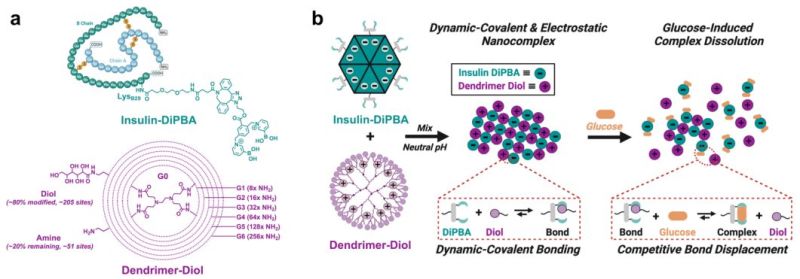A major challenge for people who have a form of diabetes is the need to regulate the glucose levels in their body. Normally this is where the body’s insulin-producing cells would respond to glucose with a matching amount of insulin, but in absence of this response it is up to the patient to manually inject insulin. Yet recent research offers the hope that these daily injections might be replaced with weekly injections, using insulin-binding substances that provide a glucose-response rather like the natural one. One such approach was tested by Juan Zhang and colleagues, with the results detailed in Nature Biomedical Engineering.
In this study, the researchers injected a group of diabetic (type 1) mice and minipigs with the formulation, consisting out of gluconic acid-modified recombinant human insulin bound to a glucose-responsive phenylboronic acid-diol complex. The phenylboronic acid element binds more easily to glucose, which results in the insulin being released, with no significant hypoglycemia observed in this small non-human test group. A major advantage of this mechanism is that it is fully self-regulating through the amount of glucose present in the blood.
This study is similar to work by Sijie Xian and colleagues published in Advanced Materials (ChemRxiv preprint) where a similar complex of glucose-sensitive, bound insulin complex was studied, albeit in vitro. With non-human animal testing showing good results for this method, human trials may not be far off, which could mean the end to daily glucose and insulin management for millions in the US alone.
(Top image: Chemical structures of the insulin-DiPBA complex and its functioning. Credit: Sijie Xian et al., 2023)

















Speaking as the carer for a 94-year-old and forgetful diabetic, I don’t think this is a good idea. The problem is that it’s a lot more difficult to form a habit of doing something every seven days than to do it every morning. I would be bound to forget sometimes, and missing a week’s dose is much worse than missing a day’s.
As a T2 diabetic myself, that’s a very good point. If one carries a phone constantly, it can be set for an alarm every seven days. Whether that helps depends on the patient. If the patient does self-care it might help to avoid the ups and downs I see in my glucose levels. :(
I’m guessing it’s not that simple. It reads like they effectively inject a ‘reservoir’ of insulin, and it gets used as the body requests it. So depending on diet etc, it’ll last a variable amount of time. This is going to make real-time monitoring more important as you’ll not know the reservoir is running low until the blood sugar reading starts dropping.
I guess you could ‘top up’ regularly, but I’d imagine there is an upper limit as well as a lower limit.
My problem is injecting long duration insulin and then predicting future carb loads of future meals. Darn near impossible being a tourist in foreign places, end up with either jitters or shakes. Neither optimal
What’s the difference between the jitters and the shakes? What I see is irritability and torpor.
Well harder to break a habit, than if weekly became the norm.
As a 50yo Type 1, anything that reduces the amount of times I have to stab myself every day is welcome.
Wow, we shouldn’t do this because people can forget and the duration is variable? I find it hard not to cheer this development. It’s not a cure but seems like a very welcome advance. Yes, you need to monitor the blood (though probably at a lower frequency) but diabetes is a disease that needs management and a lower management load is always going to be better.
I’m just curious as to how this interacts with foods, alcohol, artificial sweeteners, drugs, etc.
As a 61yo type 1 diabetic (43 yrs) I would very much welcome this!! It would be very easy to set a weekly alarm on my phone to take this wkly shot & much easier to manage than the present 24/7 burden. With my current DexCom + iPhone to continuously (automatically) monitor blood glucose levels, it would come very close to acting like a closed-loop mechanical pancreas. Would be life-changing. Excellent work!
—“Sign me up” in SLC!
The Omnipod 5 has been amazing. See if you can get one.
Could use a persons dna, some insulin cells, and some stem cells to grow some extra cells and then implant. Hopefully the body doesn’t send whit blood cells after em, and they can divide and multiply on they own naturally
What about insulin via inhaler?